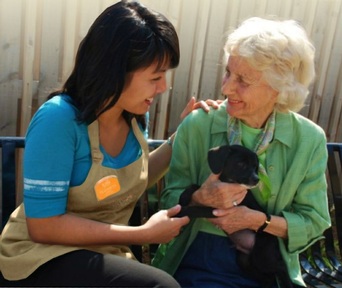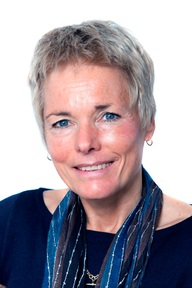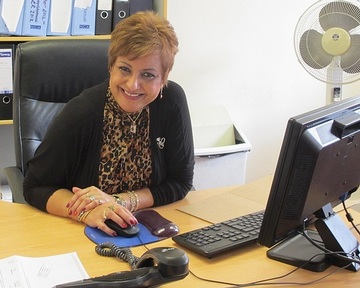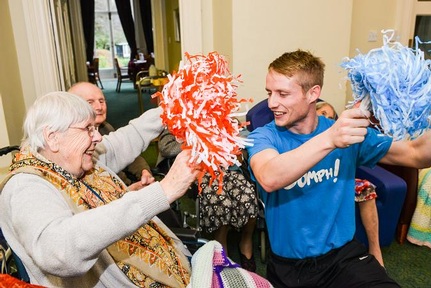Profile: Care homes director Guy Geller drawn to ethos of Sunrise Senior Living with policy of pets and no staff uniform
Sunrise Senior Living UK is quite unusual. It allows residents to bring their pets with them. Its care homes are called ‘communities’ and there is a no uniform policy for staff.

Guy Geller, who took over as managing director of Sunrise Senior Living UK a year and a half ago was drawn to Sunrise “because of the ethos of the company - creating a ‘home-from-home’ for older people, instead of a sterile institution”.
Since taking the helm he has “really put a focus on delivering excellent care in a consistent manner”.
“When I came here there was a focus on care but it wasn’t consistent from community to community. We were on the Care Quality Commission’s risk list when I first got here. Now we do not feature on the risk list at all,” he says.
offers resident-centred community living designed to encourage independence and freedom of choice for residents.
“We call our care homes ‘communities’ and people choose to come to us because of the lifestyle choices we offer. We enable them to remain independent if they wish to and use the home as a base for allowing them a life outside of our walls without the fear of managing every aspect of owning a home and dealing with their own daily needs.”
Pets are an unusual feature of Sunrise’s 27 ‘communities’.
“We encourage pets in our ‘communities’. Not a huge amount of people do this but we do have around 10 people in each home who have a pet. Each of the ‘communities’ has a rescue pet for the other residents to share and take for walks.

“I am a pet lover and our chief executive in the US is very keen on having pets in care homes. It is their home and they should be allowed to have their pets there. People shouldn’t have to make that decision when they go into care of what to do with their best friend. People shouldn’t have to leave behind the thing they often care for most,” says Mr Geller.
There are 3,500 staff at Sunrise Senior Living UK and the company has a no uniform policy.
“Working in a care home tends to be a huge and often thankless task,” he explains.
“We want to make our staff is as happy as they can be and make it a place where they enjoy being which is partly why we brought in our no uniform policy. How staff dress allows them to express themselves. There is also the impact on the residents and we can see the difference that uniformed people can have on residents when we have agency staff in our community. It changes the attitude of the residents and makes them less familiar and more on edge.”
Most of Sunrise’s ‘communities’ have 20-40 volunteers, who help out at events and in the cafés.
“We want to integrate with people in the community and be a centre for community gathering. We encourage local people to come and visit and for our residents to go out into the community as much as possible.” Mr Geller has been involved in the care sector for 15 years.
His first job was in real estate for an operator of care homes in America.
“The chief executive felt it was important for me to understand the business from the ground up and so he put me to work doing every task you can imagine in a care home.”
Mr Geller sees the care sector changing in the coming years and is full of optimism for the future.
“I see a better future where we provide better care and better services and where more care homes are integrating dementia care into the home. I see the actual care home buildings getting better and better and also bigger, moving away from 30 bed homes to homes with over 100 beds. I also think we will see more specific dementia homes being built,” he says.
However he adds: “I think we have to challenge people’s perception in terms of public funding. We need to look at how we can not only sustain people’s bodies who have dementia but also sustain their minds. I am proud of how we have been doing person centred dementia care at Sunrise Senior Living.”

He believes the difference between clinical and social care in this country is a big problem. “If you have a resident who has dementia and is being treated in a dementia unit, if they develop a nursing need such as needing a catheter which they can get with NHS funding, they are often moved out of the specialist dementia unit which puts them at risk and takes away their liberties. We need integration which focusses on the wellbeing of the individual,” he says.
Funding is a big challenge for the care sector and Mr Geller sees the Dilnot cap “as a very viable option”.
“More and more care home providers are focussing on people who can fund their own care so they don’t have to rely on local authority funding so care insurance is a good idea. I would like to see a multi-pronged approach with more insurance companies providing long-term insurance.”
Mr Geller is a firm believer in training and prefers to have people working with dementia patients who have specialist dementia training.
Sunrise Senior Living is currently sponsoring Alzheimer’s Society’s Research Network. Mr Geller says: “If we hope to find a cure for dementia it is essential that we invest in research and share experience and expertise.”
In terms of Sunrise Senior Living, Mr Geller aims high and says “we shall be focussing on making sure we have the best product in the world. Next year we will be concentrating more on improving our dementia care.”
Sunrise Senior Living UK is in the process of being sold to a company in America, Health Care REIT (HCN). “Our brand will remain the same. The benefit may be that they may want to expand our presence,” he says.
Interesting facts
First job: I worked for a large retirement village in Chicago learning the ropes of working in the care sector
Favourite book: Mongels and Mamluks: The Mamluk-Ilkhanid War, 1260-1281 by Reuven Amitai-Preiss
Favourite film: The Hustler
Favourite piece of music: The Blues
What is the best present you have received: When I started working for Sunrise Senior Living, I commuted from America and my wife and daughters sent a photograph of themselves to my office
Last holiday: Caribbean
Latest Profiles News
 05-Sep-16
Being chief executive of a care home provider is a 'huge responsibility and privilege'
05-Sep-16
Being chief executive of a care home provider is a 'huge responsibility and privilege'
 31-Mar-15
Profile: 'Both local and national Government needs to put its money where its mouth is,' says chair of the National Care Association
31-Mar-15
Profile: 'Both local and national Government needs to put its money where its mouth is,' says chair of the National Care Association
 16-Dec-14
Profile: Care home turnaround specialist reveals some of the tricks of the trade
16-Dec-14
Profile: Care home turnaround specialist reveals some of the tricks of the trade
 01-Dec-14
Profile: ‘People should not be dreading going into a care home – they should be looking forward to it,’ says care home boss
01-Dec-14
Profile: ‘People should not be dreading going into a care home – they should be looking forward to it,’ says care home boss
 07-Oct-14
Exercise is key to 'changing the care sector' says provider of exercise therapy in care homes
07-Oct-14
Exercise is key to 'changing the care sector' says provider of exercise therapy in care homes